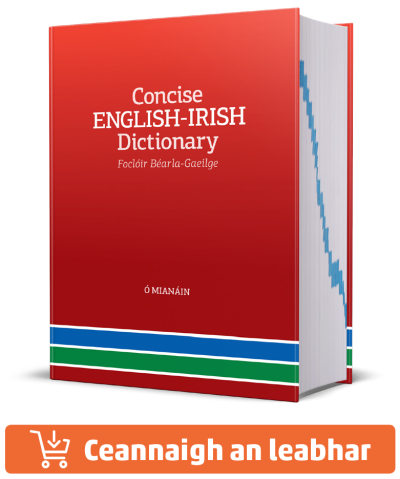Foclóir Gaeilge–Béarla
Ó Dónaill, 1977
An Foclóir Beag
Ó Dónaill & Ua Maoileoin, 1991
English–Irish Dictionary
de Bhaldraithe, 1959
Gramadach
Foghraíocht
trust
trustáil
trustal
trustúil
trut
truthaí
tseo
tú
tua
tuadóir
tuadóireacht
tuafaiste
tuagh
tuaghadh
tuaghdóir
tuaicheall
tuaichle
tuaifeal
tuaifisc
tuaifisceach
tuaigh
tuaileáil
tuaileas
tú, 2 sg. pron. You. 1. (a) (Subject of vb.) Tá ~ déanach, you are late. Chuala ~ an ráfla, you heard the rumour. Níor chreid ~ mé, you didn’t believe me. (b) (With copula) Is ~ an máistir, you are the master. Ní ~ a rinne é, it was not you who did it. Dá mba ~ an diabhal, even if you were the devil. Nach ~ atá dearcach! How considerate of you! (c) (Virtual subject of vn.) ‘Cad chuige?’ ‘~ a bheith cineálta leo’. ‘Why?’ ‘Because you were kind to them’. (d) (After agus) Ní éistfeá liom agus ~ sa láthair? You wouldn’t listen to me although you were present? (e) (After prepositions that have no pron. form) Ach ~, except for you. Gan ~, without you. 2. (Form thú used as object of vb.) (a) (Direct object) Aithním thú, I recognise you. Níor dhearmad sé thú, he didn’t forget you. (b) (With autonomous vb.) An áit ar rugadh thú, where you were born. (Var: tu, thu)
ABAIRTÍ
IN FOCLÓIR GAEILGE—BÉARLA
Féadann tú a n-iarraidh air, you may ask him for them.
An bhfuair tú a raibh uait? Did you get all that you wanted?
Íocfaidh mé as a gceannóidh tú, I will pay for whatever you will buy.
Céard atá tú a rá? What are you saying?
Tú féin a dúirt é, it was you who said it.
~ é! ~ sin! Dúirt tú é! D’fhéadfá a rá! You’ve said it! You’re perfectly right!
Ní tú atá mé a rá, I am not referring to you.
Ná bíodh sé le rá leat gur loic tú, let it not be cast up to you that you defaulted.
Níl tú ~ ag amaidí, you are only fooling.
Gheobhaidh tú é ~ íoc as, you will get it if you pay for it.
Níor ~ tú mo litir, you did not acknowledge my letter.
Tá tú agam anois! I have (grasp, comprehend) you now!
Beidh tú aige! He will have your life!
Bíodh ~ go bhfaca tú é, granted that you saw him.
Is tú an t-~, you are a right devil.
Rinne tú ~, it was quite an achievement for you.
Tá tú ar bhealach d’~a, you are on the road to ruin.
Cén chaoi a n-airíonn tú? How do you feel?
An airíonn tú leat mé? Do you hear me?
Ar ~ tú an ceann seo? Did you count, include, this one?
Tá tú in ~ do bhuailte, you are in for a hiding.
Níl tú in ~ a bheith ag caint, you shouldn’t speak in the circumstances.
Is maith an áit a bhfuil tú! Mind where you speak!
Aithneoidh tú agat an béile, an buille, sin, you will feel the benefit of that meal, the effect of that blow.
Beidh a ~ ort, beidh tú ina ~, you will rue it.
~ ar chuala tú, repeat what you heard.
Tá tú i do strainséir ~ agam, you are a complete stranger to me.
Ní fheicfidh tú aon ~ go deo orthu, you will never see them again.
Más ~ go bhfuil tú ag imeacht, if in fact you are going away.
An ~ nach dtuigeann tú mé? Is it that you do not understand me?
Tá tú ~ againn, we have wasted your time, kept you from your work.
Bhain tú an t-~ asam, you frightened the life out of me.
Cuirfidh tú ~ ort féin ag casadh do bhéil mar sin, you will distort your face grimacing like that.
Chugam ~ tú! Bravo!
Is tú atá ~! So it is you! How like you!
Is tú is cóir a bheith ~! You are a lucky beggar!
Tá tú luath, rud ab ~ leat, you are early, which is seldom the case with you.
Tá tú ~ ! There you are!
Is tú an t-~ duine (amháin) a labhair liom, you are the only person who spoke to me.
Ar bhris tú é? Did you break it?
Cuirfidh tú ~ ionat féin ag gáire, you will give yourself a pain in the side from laughing.
Tá tú as an imirt, you are out of the game.
Tá tú as, you are out of it.
Tá ~ orm go bhfuil tú go maith, I am glad you are well.
Má bhaineann tú de ní bheidh mórán áthais ort, if you interfere with him you will regret it afterwards.
Ní dhéanfaidh tú ar a ~ de dhóigh é, you will not (be able to) do it in any other way.
Níor ~ tú ó chonaic mé go deireanach thú, you haven’t changed since I saw you last.
Tá tú fliuch báite, you are soaking wet.
Ba mhaith an bhail ort go ndearna tú é, it was well for you that you did it.
Ní ~ a bhí tú imithe nuair a tháinig sé, you had only just left when he arrived.
